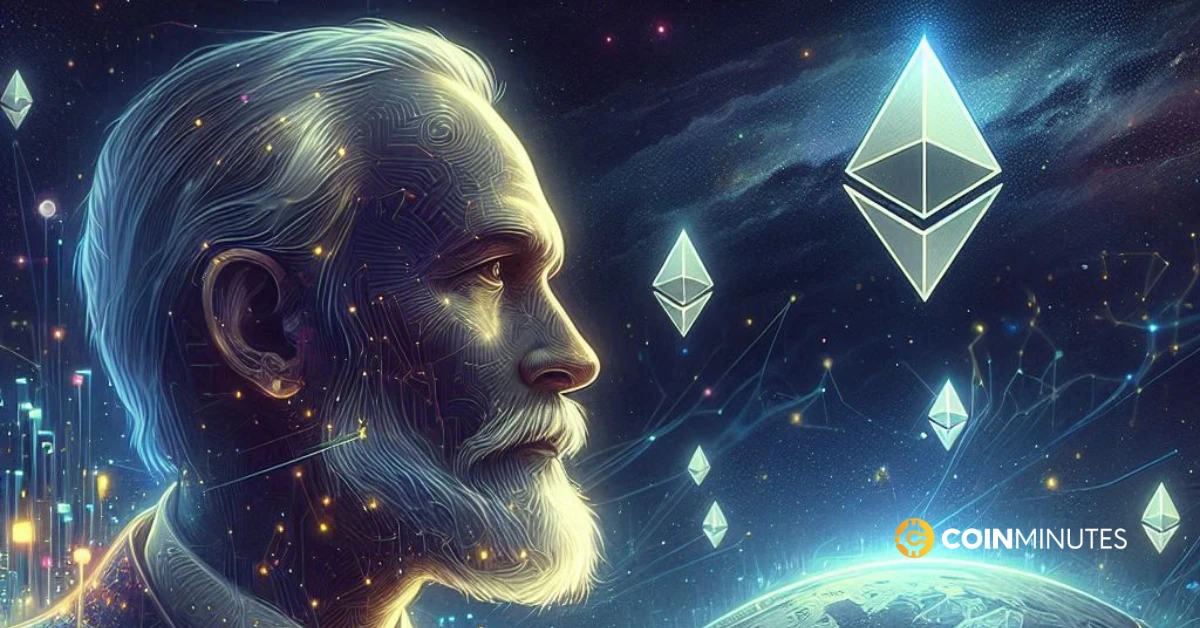Vitalik Buterin is likely a familiar name to most investors in the cryptocurrency market. He is the founder of Ethereum, the second-largest blockchain platform by market capitalization, second only to Bitcoin. What makes his life so remarkable? Join CoinMinutes as we explore the story of this influential figure in this article!
Key Takeaways
|
Early Life and Background of Vitalik Buterin
Vitalik Buterin, born on January 31, 1994, is a Russian-Canadian programmer renowned worldwide as the co-founder of the Ethereum blockchain platform. Alongside his collaborators, including Dimitry Buterin, Gavin Wood, Charles Hoskinson, Anthony Di Iorio, and Joseph Lubin, Vitalik has made a significant impact on the cryptocurrency landscape.
From a young age, Vitalik displayed an exceptional talent for mathematics. At just four years old, his favorite toy was Microsoft Excel. In elementary school, he was placed in a program for gifted students, where he honed his skills in mathematics, programming, and economics. Remarkably, he could perform mental arithmetic with three-digit numbers twice as fast as his peers.
At 17, while searching for his life’s direction, Vitalik discovered Bitcoin through his father, a computer scientist. Bitcoin was only two years old at the time. Initially skeptical about its value due to its lack of backing (unlike traditional currencies backed by gold), Vitalik’s curiosity grew as he delved deeper. However, he lacked the resources to mine or purchase Bitcoin. Determined to get involved, he started writing for Bitcoin Weekly, earning 5 BTC per article (equivalent to $3.50).
Vitalik’s articles caught the attention of Mihai Alisie, a Bitcoin enthusiast from Romania. In 2011, Mihai invited Vitalik to co-found Bitcoin Magazine, where Vitalik became the lead writer.
In 2012, Vitalik graduated high school and enrolled in Computer Science at the University of Waterloo, Canada. There, he worked as a research assistant for cryptographer Ian Goldberg, former chairman of the Tor Project, a nonprofit focused on digital privacy.
In May 2013, as a reporter for Bitcoin Magazine, Vitalik attended a conference in California, meeting Bitcoiners from around the world. Witnessing the thriving crypto community, he dropped out of university to fully immerse himself in the burgeoning cryptocurrency wave.
Over the next five months, Vitalik traveled the world, exploring various crypto projects. He noticed these projects were attempting to build layers on top of Bitcoin, leading to significant security issues due to Bitcoin’s limited scripting language.
Vitalik realized that using a Turing-complete programming language to create a new version of Bitcoin could enable groundbreaking digital services like decentralized social networks, stock markets, and government-free digital corporations. Despite his innovative vision, he struggled to find collaborators and eventually decided to go solo.
By 2017, Vitalik was recognized as one of the top 10 most influential people under 40 and featured in Forbes’ 30 Under 30 list.
Vitalik Buterin’s journey from a math prodigy to a leading figure in the crypto world is a testament to his vision and dedication, paving the way for the future of blockchain technology.
Creator of Ethereum
In November 2013, Vitalik Buterin finalized his concept for Ethereum and shared the white paper with his friends. The response was overwhelmingly positive, and around 30 people reached out to discuss the opportunity.
On January 26, 2014, Vitalik introduced Ethereum at the North American Bitcoin Conference in Miami. He described it as a global computer powered by a decentralized network, with potential applications in insurance, decentralized exchanges, and DAOs. Vitalik was enthusiastically received by those who believed Ethereum could be a remarkable successor to Bitcoin.
A few months after the conference, Ethereum held an Initial Coin Offering (ICO) for its native token, Ether, successfully raising 31,000 BTC (approximately $18 million at the time). The Ethereum Foundation, a non-profit based in Switzerland, was established to oversee the development of Ethereum’s open-source software.
In 2015, the first fully functional version of Ethereum, called Frontier, was launched. The platform quickly garnered attention from tech giants like IBM and Microsoft.
In 2016, Ethereum faced a historic challenge: The DAO, a decentralized autonomous organization on Ethereum, was hacked due to a flaw in its code, just after raising over $150 million in ETH from more than 11,000 members. The hacker couldn’t immediately move the funds, as the DAO’s smart contract required a 28-day holding period.
Vitalik proposed a soft fork to blacklist the hacker and prevent the stolen funds from being transferred. However, the hacker claimed the funds were legally obtained by exploiting a technical loophole in the DAO and threatened legal consequences for anyone attempting to retrieve the Ether.
After intense public debate, on July 20, 2016, at block 192,000, Ethereum implemented a hard fork to recover the stolen funds. This decision split the network into two separate blockchains: Ethereum (ETH), the new chain, and Ethereum Classic (ETC), the original chain.
The hard fork sparked controversy, as blockchains are designed to be immutable and resistant to censorship. The incident raised technical challenges and ethical and philosophical questions about the technology and the resilience of the Ethereum team. Nevertheless, Vitalik accepted the criticism to protect users’ assets.
Vitalik’s perseverance paid off, leading to a successful year for Ethereum in 2017. The price of ETH soared from $40 to $826. Currently, ETH remains a strong contender in the market, valued at $3,800 per ETH.
Vitalik Buterin Influence and Recognition
Throughout his illustrious career, Vitalik Buterin has achieved numerous significant milestones:
- 2012: Won a bronze medal at the International Olympiad in Informatics.
- June 2014: Awarded the Thiel Fellowship, a scholarship supporting students under 22 to leave school and pursue other work.
- November 2014: Surpassed Facebook’s Mark Zuckerberg to win the World Technology Network (WTN) award.
- July 2018: Featured in Forbes’ list of “40 Under 40” most influential young people.
- November 2018: Received an honorary doctorate from the University of Basel.
- December 2021: Included in Forbes’ “30 Under 30” list of the brightest young people.
With Ethereum, Vitalik has not only shaped his future but also created a platform that empowers millions to build, develop, and achieve their dreams, even those he has never met.
Vitalik Buterin’s Future Vision
Vitalik Buterin envisions upgrading Ethereum to Ethereum 2.0, also known as Serenity, by transitioning from Proof of Work (PoW) to Proof of Stake (PoS). This upgrade aims to make Ethereum transactions faster, more efficient, and scalable. PoS is also expected to use about 99.95% less energy than PoW.
The upgrade process consists of three separate phases, each occurring at different times:
- Beacon Chain: Launched in 2020, this introduced staking to Ethereum and paved the way for future upgrades.
- The Merge: Expected to launch in Q2 2022, this phase will merge the Beacon Chain with Ethereum’s mainnet, enabling staking and marking the end of mining.
- Shard Chains: Scheduled for 2023, this phase will implement sharding, dividing the Ethereum network into smaller, more manageable parts. This will enhance Ethereum’s transaction processing, storage, and data access capabilities.
The Ethereum upgrade has faced multiple delays. Vitalik attributes the extended timeline mainly to frequent conflicts within the project team.
Despite the setbacks, Vitalik’s commitment to improving Ethereum continues to drive the project forward, aiming to make the network more efficient and sustainable for its global user base.
The Bottom Line
Vitalik Buterin is one of the most renowned figures in the cryptocurrency market, with numerous contributions to the development of blockchain technology. Through this article, CoinMinutes hopes you have gained valuable insights into this influential individual. See you in our future articles.








